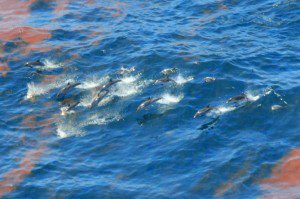Two years after an explosion killed 11 workers and sent oil spewing into the Gulf of Mexico, BP has paid nearly $2.7 billion in claims to Florida businesses and individuals for damages caused by the worst spill in U.S. history.
Florida regions economically devastated by the spill that began April 20, 2010, have generally rebounded, as tourists have returned to the beaches. Florida’s coast was largely spared the brunt of the Deepwater Horizon oil spill, which flooded the Gulf with 4.9 million barrels of oil and nearly 2 million gallons of chemical dispersants, but wreaked most of its havoc on the open Gulf itself and the coastal areas of Louisiana, and to some degree Mississippi and Alabama.
While Florida beaches weren’t fouled to the extent of those in neighboring states, the tourists didn’t make the distinction and many Florida destinations lost a year or more of income.
Along with payments to individuals and businesses totaling more than $6.3 billion to date, BP has spent millions more to reimburse local and state governments from Louisiana to Florida on an array of fronts from helping market Florida seafood to restoring sand dunes and building parks in the Pensacola area.
But despite the dollars spent, critics say the long-range effects of the spill may take years to ascertain, while the issue slips from the collective memory of state and federal officials charged with making sure BP pays to clean up the mess.
Settlement Reached, Projects Approved
On Wednesday, the company announced a settlement in a lawsuit brought by more than 100,000 individual and business plaintiffs. The settlement, estimated by BP officials to cost the company $7.8 billion, does not have a cap and is expected to be one of the largest class action settlements in history.
U.S. District Judge Carl Barbier in New Orleans is expected to consider the request April 25.
Before Wednesday’s announcement, BP had paid more than $8.1 billion to individuals, businesses and governments and another $14 billion on operational response. The company has taken a $37.2 billion charge on its financial books, a figure that includes $20 billion placed in a trust fund administered by the Gulf Coast Claims Facility.
In addition, the Deepwater Horizon Natural Resource Damage Assessment Trustee Council has earmarked $60 million for eight projects, including two in Florida.
“Florida’s focus on early restoration has been to ensure environmental impacts are addressed as well as to make up for the loss of access to our natural resources by residents and visitors alike,” said Florida trustee representative Mimi A. Drew in a statement.
Though acknowledging that tourists have returned to the state, Carol Dover, president of the Florida Restaurant and Lodging Association, said the group will also continue to monitor the repayment progress.
“We remain optimistic, yet vigilant, that claims will continue to be paid through the GCCF to industry members and that Florida’s state and national elected officials will maintain the ban on oil drilling off our shores,” Dover said.
An independent audit of the Gulf Coast Claims Facility, requested by members of Congress, was released Wednesday and said some 7,300 claimants will get more money than they originally were alotted.
“We heard from a number of people who felt they were shortchanged,” said U.S. Sen. Bill Nelson, Democrat of Florida. “I’m glad now many of these folks in Florida and the other Gulf Coast states will be more fully compensated.”
By Michael Peltier



